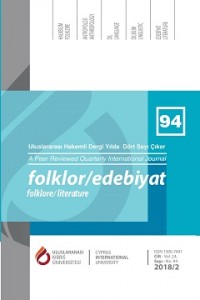Öz
Ernst Bloch is a 20th-century German philosopher, associated with the Frankfurt School of
critical theory. His most important philosophical works are The Principle of Hope (1959) and The
Spirit of Utopia (1918). The aim of this paper is to explore Bloch’s views on childhood and education
in the context of his own upbringing. Special attention will be paid to two important influences
on Bloch’s thought: Romanticism and Marxism. This paper will be divided into three parts: The
first part will provide a portrait of Bloch’s childhood and youth. It will trace his early inclination
toward Marxism and Romanticism and elucidate Bloch’s attitude toward conventional education
and learning. The second part will focus on the relationship between childhood, education and the
human imagination. It will contain references to the following literary texts: William Blake’s “The
School Boy”, Samuel Taylor Coleridge’s “Frost At Midnight”, William Wordsworth’s “My Heart
Leaps Up” and Johann Wolfgang von Goethe’s The Sorrows of Young Werther. The third part will
focus on the role of critical thinking in education. It will outline Bloch’s critique of conventional
education in capitalist society and his vision of a different kind of education. Please note that all
translations from Bloch’s Das Prinzip Hoffnung (The Principle of Hope), Pädagogica, Spuren
(Traces) and Literarische Aufsätze (Literary Essays) are my translations.
Anahtar Kelimeler
Ernst Bloch childhood education Marxism romantic literature Blake Coleridge
Kaynakça
- Bloch, E. (1930) Spuren. reprint 1978. Frankfurt am Main: Verlag.
- Bloch, E. (1959) Das Prinzip Hoffnung I. Frankfurt am Main: Verlag.
- Bloch, E. (1959) Das Prinzip Hoffnung III. Frankfurt am Main: Verlag.
- Bloch, E. (1967) Auswahl aus seinen Schriften. Frankfurt am Main: Fischer Bücherei.
- Bloch, E. (1975), Experimentum mundi: Frage, kategorien des herausbringens, praxis. Frankfurt am Main: Verlag.
- Bloch, E. (1923) Geist der utopie. Reprint 1964. Frankfurt am Main: Verlag.
- Bloch, E. (1965) Literarische uufsätze. Reprint 1985. Frankfurt am main: Verlag.
- Bloch, E. (1971) Pädagogica. Frankfurt am Main: Suhrkamp Verlag.
- Freire, P. (2000) Pedagogy of the oppressed, New York: Continuum.
- Goethe, J. W. von, 1774. The Sorrows of young Werther, translated by Michael Hulse. 1989. London: Penguin.
- Markun, S. Ernst Bloch in selbstzeugnissen und bilddokumenten. Reinbek bei Hamburg: Rowohlt Verlag.
- Marcuse, H. (1964) One-Dimensional Man. Boston: Beacon.
- Marx, K. and Friedrich Engels (1945), Manifest der Kommunistischen Partei, Berlin: Dietz Verlag.
- Schiller, F. (1795) Über naïve und sentimentalische Dichtung. Reprint 1997. Stuttgart: Reclam.
- Schiller, F. (1795) Über die ästhetische Erziehung des Menschen. Reprint 1965. Stuttgart: Reclam.
Ayrıntılar
| Birincil Dil | İngilizce |
|---|---|
| Konular | Dilbilim, Sanat ve Edebiyat |
| Bölüm | Derleme Makaleleri -Compilation Articles |
| Yazarlar | |
| Yayımlanma Tarihi | 1 Mayıs 2018 |
| Yayımlandığı Sayı | Yıl 2018 Cilt: 24 Sayı: 94 |
Derginin yayım dili Türkçe ve İngilizce’dir, ayrıca Türkçe de olsa tüm basılan makalelerin başlık, öz ve anahtar sözcükleri İngilizce olarak da makalede bulunur. Hakemlerden onay almış Türkçe makaleler için 750-1000 sözcükten oluşan genişletilmiş özet (extended summary) gereklidir. Elektronik çeviriler kabul edilmez.
Dergi TR-Dizin, Web of Science (ESCI), DOAJ ile diğer pek çok dizin tarafından taranmaktadır. Scimagoe quartile değeri: Q2 'dir:
TR DIZIN 2020 Etik Kriterleri kapsamında, dergimize 2020 yılından itibaren etik kurul izni gerektiren çalışmalar için makalenin yöntem bölümünde ilgili Etik Kurul Onayı ile ilgili bilgilere (kurul-tarih-sayı) yer verilmesi gerekecektir. Bu nedenle dergimize makale gönderecek olan yazarlarımızın ilgili kriteri göz önünde bulundurarak makalelerini düzenlemeleri önemle rica olunur.
Alan Editörleri/ Field Editörs
Halkbilimi/Folklore
Prof.Dr. Hande Birkalan-Gedik (JohannWolfgang-Goethe İniversitet-birkalan-gedik@m.uni-frankfurt.de)
Prof.Dr. Ali Yakıcı (Gazi Üniversitesi-yakici@gazi.edu.tr)
Prof.Dr. Aynur Koçak (Yıldız Teknik Üniversitesi-nurkocak@yildiz.edu.tr)
Prof.Dr. Işıl Altun (Regensburg Üniversitesi/Kocaeli Üniversitesi-İsil.Altun@zsk.uni-regensburg.de)
Doç.Dr. Ahmet Keskin (Samsun Üniversitesi-ahmet.keskin@samsun.edu.tr)
Edebiyat/Literature
Prof.Dr. Abdullah Uçman (Mimar Sinan Güzel Sanatlar Üniversitesi -emekli-29 MayısÜniversitesi-abdullahucman@29mayis.edu.tr
Prof. Dr. Ramazan Korkmaz (Ardahan Üniversitesi-emekli-Kafkasya Üniversiteler Birliği -KÜNİB-r_korkmaz@hotmail.com)
Prof.Dr. Emel Kefeli (Marmara Üniversitesi-emekli-İstanbul 29 Mayıs Üniversitesi-ayseemelkefeli @gmail.com)
Prof.Dr. Zekiye Antakyalıoğlu ( İstanbul Aydın Üniversitesi-zekabe@hotmail.com)
Antropoloji/Anthropology
Prof.Dr. Hanife Aliefendioğlu (Doğu Akdeniz Üniversitesi-hanife.aliefendioglu@emu.edu.tr)
Prof. Dr. Şebnem Pala Güzel (Başkent Üniversitesi-sebnempa@baskent.edu.tr)
Prof.Dr. Derya Atamtürk Duyar (İstanbul Üniversitesi-datamturk@istanbul.edu.tr)
Prof.Dr. Meryem Bulut (Ankara Üniversitesi-meryem.bulut@gmail.com)
Dil-Dilbilim/Language-Linguistics
Prof.Dr. Nurettin Demir (Hacettepe Üniversitesi-demir@hacettepe.edu.tr)
Prof. Dr. Aysu Erden (Maltepe Üniversitesi-aysuerden777@gmail.com)
Prof.Dr. Sema Aslan Demir (Hacettepe Üniversitesi-semaaslan@hacettepe.edu.tr)


